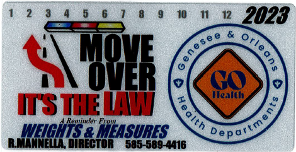Maybe you've seen those yellow stickers stuck to the gas pump by the county's department of Weights and Measures, and maybe—like me—you've asked yourself: What does that mean? Who is this Donald D. Luxon fellow? What is he measuring? What is his sticker worth and why can't it be detached? Earlier this week, I set out to answer those question.
Let's start with the easy answer: Weights and Measures weighs and measures. Very funny, you say. But it's true. OK, so let's back up then...
Donald Luxon is the department's director. He's been with them for nine years or so now, ever since he left Eastman Kodak Co. He admits to me that he wishes he had always had this job though. He loves it. And why shouldn't he? He gets out and works with people all over the county all year long. He gets to play with cool equipment, like tolerance measures and apothecary weights. Plus, he's a one-man show.
On a given day, you may find him out at the gas pumps of any station in the county, measuring fuel. It works like this: He fills a five-gallon can with each grade of gas and measures what his can tells him against what the pump tells him was just dispensed. If they match up, great. If they don't, well... it depends. If the pumps are issuing too much gas—that is, if it's in the customer's favor, Luxon can't shut it down. But you can bet, he says, that the station will have that fixed pretty quickly. If the pump is issuing less fuel than it says, then the station owner is notified and the pump can be shut down if it isn't fixed. Luxon tells me that he has never had to fine anyone before, and folks always fix a problem once they're aware of it.
(In case you're wondering: the pumps are permitted a tolerance of plus or minus six cubic inches per five gallons, which is about 1,155 cubic inches total.)
Often, too, Luxon will take samples of the gas that he then sends to a lab in New Jersey to be tested for octane and to make sure there isn't too much of this or that in the gasoline. He says that there's never once been a failure in Genesee County since he took over the job nine years ago.
Such work also gives you a pretty good handle on how the pumps work. Luxon says he often hears folks say that the temperature outside ought to be a clue on when folks should fuel up because the gasoline will either expand or contract depending on how cold or warm it is. Sure, that's true to an extent, he says. But most of the gas is in big tanks underground where there are no significant shifts in temperature. Whether it's hot or cold outside will only really affect about the first half gallon of gas that's in the tube that runs from the handle back into the tank.
Another rumor that turns out has some merit to it is that folks shouldn't fuel up when they see a tanker filling up the underground tanks. It's believed that in filling up those enormous tanks, the gasoline gets all jostled about and some of the sediment and particulates at the bottom of the tank get stirred up and can end up in your tank. That's true, too, to an extent, says Luxon. It's a fine rule of thumb to keep away from the pumps when you see they're being refilled, but if you do fill up at that time, the chances that you'll get the crud in your tank are pretty slim.
Luxon's job isn't all about the gas pumps, though. He also checks other tanks: milk tanks. Just as often as he'll head out to a gas pump, he'll head to a dairy farm to make sure that a 10,000 gallon milk storage tank is really holding 10,000 gallons.
That's the measures side of the gig, but Luxon also does a lot with weights. In fact, he checks every single scale in every grocery store, quarry and pharmacy in the county: whether it's used to weigh a tomato, a trucker's haul, a slice of head cheese, a flank steak or a dose of valium.


